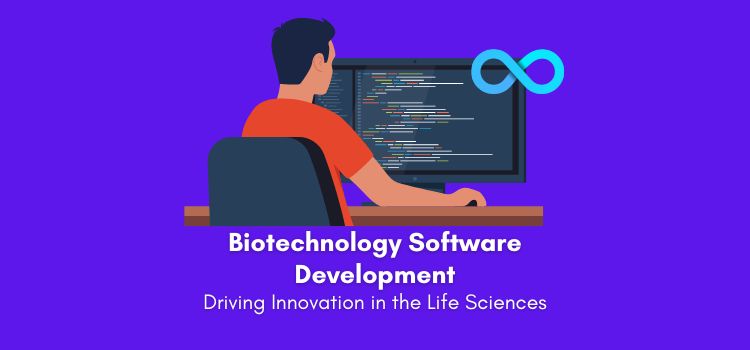Biotechnology software development is revolutionizing the field of life sciences, paving the way for groundbreaking discoveries and innovations. From streamlining research processes to enhancing healthcare delivery, the integration of software solutions has become indispensable in modern biotechnology.

In this article, we delve into the evolution, current trends, challenges, and future directions of biotechnology software development, highlighting its profound impact on various sectors.
Introduction to Biotechnology Software Development
Biotechnology encompasses a wide range of technologies that utilize biological systems, organisms, or derivatives to develop products and processes for specific applications. In recent years, there has been a growing emphasis on leveraging software tools and algorithms to augment traditional biotechnological methods. This convergence of biology and technology has given rise to biotechnology software development, which plays a pivotal role in advancing scientific research and industrial applications.
Evolution of Biotechnology Software
The development of biotechnology software can be traced back to the emergence of bioinformatics in the 1970s, which focused on the computational analysis of biological data, such as DNA sequences. Over the decades, advancements in computing power and algorithms have led to the evolution of sophisticated software platforms tailored to the needs of biotechnologies.
From sequence alignment algorithms to molecular modeling software, the toolbox of biotechnology professionals has expanded significantly, enabling them to tackle complex biological problems with greater precision and efficiency.
Current Trends in Biotechnology Software
One of the key trends in biotechnology software development is the integration of artificial intelligence (AI) and machine learning (ML) algorithms. These technologies enable researchers to analyze large datasets, predict biological interactions, and discover novel patterns and insights.
Moreover, cloud-based solutions have become increasingly prevalent, allowing for seamless collaboration and data sharing among researchers and organizations worldwide. Additionally, data analytics and visualization tools play a crucial role in extracting actionable insights from complex biological data, facilitating informed decision-making in various domains.
Challenges in Biotechnology Software Development
Despite its immense potential, biotechnology software development faces several challenges. Regulatory compliance is a major concern, particularly in fields such as pharmaceuticals and healthcare, where strict guidelines govern the development and deployment of software solutions.
Moreover, ensuring data security and privacy poses significant challenges, given the sensitive nature of biological data. Interoperability issues also present hurdles, as different software platforms and databases may use incompatible formats and protocols, hindering seamless data integration and analysis.
Role of Biotechnology Software in Research and Development
Biotechnology software plays a critical role in accelerating research and development (R&D) efforts across various domains. In drug discovery, for example, computational models and virtual screening techniques are used to identify potential drug candidates and optimize their properties.
Similarly, genomic analysis tools enable researchers to decipher the genetic basis of diseases and develop targeted therapies. Moreover, biotechnology software facilitates the implementation of precision medicine approaches, tailoring treatments to individual patients based on their genetic makeup and other relevant factors.
Impact of Biotechnology Software on Healthcare
In the healthcare sector, biotechnology software has transformative potential, revolutionizing diagnosis, treatment, and patient care. Personalized treatments based on genetic profiling are becoming increasingly common, offering more effective and targeted interventions for various diseases.
Advanced diagnostic tools powered by biotechnology software enable early detection of illnesses, leading to better outcomes and improved prognosis. Furthermore, by streamlining administrative processes and optimizing resource allocation, biotechnology software enhances healthcare efficiency, reducing costs and improving access to quality care.
Future Directions in Biotechnology Software
Looking ahead, the field of biotechnology software is poised for further growth and innovation. Advancements in bioinformatics, fueled by developments in AI and data science, will continue to push the boundaries of biological research and discovery.
Predictive modeling and simulation techniques will enable scientists to simulate complex biological systems and predict their behavior with unprecedented accuracy. Moreover, biotechnology software will find applications beyond traditional life sciences domains, such as precision agriculture, where it can help optimize crop yields, minimize environmental impact, and ensure food security.
Ethical Considerations in Biotechnology Software Development
As biotechnology software becomes more pervasive, it is essential to address ethical considerations and societal implications. One of the key concerns is the responsible use of genetic data, ensuring that individuals’ privacy and autonomy are respected. Moreover, equitable access to biotechnology solutions must be ensured, particularly in low-resource settings where disparities in healthcare access are prevalent. Ethical issues surrounding emerging technologies such as gene editing also require careful consideration, balancing the potential benefits with ethical and social risks.
Collaborations in Biotechnology Software Development
Collaboration is key to advancing biotechnology software development and driving innovation in the life sciences. Industry-academia partnerships foster cross-disciplinary research and enable the translation of academic discoveries into commercial applications.
Similarly, collaborations among different stakeholders, including researchers, policymakers, and healthcare providers, facilitate the development of holistic solutions that address real